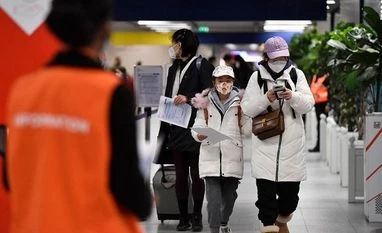Travellers streamed into China by air, land and sea on Sunday, as Beijing opened its borders that have been shut since the Covid-19 pandemic began.
After three years, mainland China opened sea and land crossings with Hong Kong and ended a requirement for incoming travellers to quarantine, dismantling a final pillar of a zero-Covid policy that had shielded China’s 1.4 billion people from the virus but also cut them off from the rest of the world.
Long queues formed at the Hong Kong international airport’s check-in counters for flights to mainland cities including Beijing, Tianjin, and Xiamen. Hong Kong media outlets estimated that thousands were crossing.
“I’m so happy, so happy, so excited. I haven’t seen my parents for many years,”said Hong Kong resident Teresa Chow as she and dozens of other travellers prepared to cross into China from Hong Kong’s Lok Ma Chau checkpoint.
“I haven’t been home in almost two years, so the announcement felt like a fever dream,” said Connor Zhao, a 25-year-old consultant who lives in San Francisco.
Investors hope the reopening will reinvigorate a $17-trillion economy suffering its slowest growth in nearly half a century. But the abrupt policy reversal has triggered a massive wave of infections that is overwhelming some hospitals and causing business disruptions.
The border opening follows Saturday’s start of “chun yun”, the 40-day period of Lunar New Year travel, which before the pandemic was the world’s largest annual migration, as people returned to their hometowns or took holidays with family.
Some 2 billion trips are expected this season, nearly double last year’s movement and recovering to 70 per cent of 2019 levels, the government says.
Many Chinese are also expected to start travelling abroad, a long-awaited shift for tourist spots in countries such as Thailand and Indonesia.
Travel will not quickly return to pre-pandemic levels due to such factors as a dearth of international flights, analysts say.
China on Sunday resumed issuing passports and travel visas for mainland residents, and ordinary visas and residence permits for foreigners. Beijing has quotas on the number of people who can travel between Hong Kong and China daily.
Concerns over rural areas
China downgraded its Covid management to Category B from A, which had allowed local authorities to quarantine patients, their close contacts, and lockdown regions.
But concerns remain that the great migration of city workers to their hometowns and reopening of borders may cause a surge in infections in smaller towns and rural areas that are less-equipped with intensive-care beds and ventilators
.
Jiao Yahui, an official from the National Health Commission, said in an interview published by state broadcaster CCTV on Sunday that demand for emergency and critical care in China’s large cities had likely peaked but was rising fast in small and midsize cities and rural areas due to the Lunar New Year travel.
Some 80 per cent of ICU beds in China’s top- and second-tier hospitals were in use, up from 54 per cent on December 25, she said, adding that the country’s medical services to treat Covid were facing an “unprecedented challenge”.
China to not include Pzifer’s Paxlovid in its health insurance drug list
China will not include Pfizer’s Paxlovid in an update to its list of medicines covered by basic medical insurance schemes as the US firm quoted a high price for the Covid-19 drug, China’s Healthcare Security Administration (NHSA) said on Sunday.
The Covid-19 antiviral drug is currently covered by the country’s broad healthcare insurance scheme under temporary measures the regulator introduced in March last year as outbreaks rose.
Inclusion on the list means a drug is accessible via state insurance schemes, which will boost volumes but comes with the condition that manufacturers lower prices. Past rounds have seen drugmakers cut prices by as much as 62 per cent after negotiations with officials.
Unlock 30+ premium stories daily hand-picked by our editors, across devices on browser and app.
Pick your 5 favourite companies, get a daily email with all news updates on them.
Full access to our intuitive epaper - clip, save, share articles from any device; newspaper archives from 2006.
Preferential invites to Business Standard events.
Curated newsletters on markets, personal finance, policy & politics, start-ups, technology, and more.
)